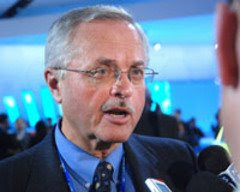Michigan-based auto industry experts are quietly playing an influential role in the deliberations of President Barack Obama's auto task force.
 Among those directly communicating with the task force is the Ann Arbor-based Center for Automotive Research, whose chairman, David Cole, previously labeled pro-bankruptcy politicians "ignorant."
Among those directly communicating with the task force is the Ann Arbor-based Center for Automotive Research, whose chairman, David Cole, previously labeled pro-bankruptcy politicians "ignorant."
At least two officials from the University of Michigan's Transportation Research Institute also have met with task force representatives to discuss various industry issues.
The task force's decision to tap Michigan's auto expertise is reflective of the influence of independent analysts in the midst of the industry's life-threatening crisis."I think what everyone has discovered is there weren't very many people who knew a lot about the industry," Cole said. "And we have a lot of data and a lot of facts that I think have been very helpful. Ultimately facts are really important."
The experts' accounts of their communications paint a picture of a task force eager to absorb a wide swath of information about the industry and willing to consider a variety of options for preserving the domestic auto industry.
"We've had a fair amount of interchange," Cole said. "They're sitting down, meeting with the companies and other people that know a little bit about the industry and trying to come up with a solution to the problem."
The president's task force - which is led by Steven Rattner, Ron Bloom and Treasury Secretary Timothy Geithner - has not shown a willingness to cave to the auto companies' request for continuous investment.
Obama is said to be seriously weighing the prospect of helping General Motors, Chrysler or both delve into a quick, surgical bankruptcy designed to place the companies on the path to profitability.
And GM CEO Fritz Henderson is talking openly about the possibility of bankruptcy - a prospect his predecessor, Rick Wagoner, largely shunned. "If we're not successful doing it out of court, we'll do it in court," Henderson said at a press conference.
CAR's chief economist, Sean McAlinden, recently traveled to Washington D.C. to meet for two days with task force advisers, Cole said. CAR officials have vocalized a concern that bankruptcy for GM or Chrysler could lead to a cascading implosion of the auto supplier base, which recently received $5 billion in federal loans as a lifeline of sorts.
But in a D.C. press conference, Obama maintained that helping the major automakers return to profitability "may mean using our bankruptcy code as a mechanism to help them restructure quickly and emerge stronger."
Despite the threat of bankruptcy, Cole praised the task force's deliberations. "They're smart guys working hard," he said. "I think the comments the president made the other day were good."
Cole, who told Business Review in December that bankruptcy of one of the major automakers would "kill Michigan," has softened his stance in light of Obama's decision to guarantee warranties for new car buyers.
"You have to provide protection for consumers," Cole said. "They're spooked enough as it is because of the credit crisis."
At U-M, meanwhile, analysts Walter McManus and Bruce Belzowski met with task force representatives - who were prepared with an exhaustive series of issues to discuss, Belzowski said.
Among the issues the task force wanted to discuss was the Chevrolet Volt, an extended range electric vehicle GM is expected to commercialize in November 2010. The Volt's 400-pound lithium-ion battery pack would allow drivers to travel 40 miles on a single charge of electricity before using gasoline.
The vehicle has drawn an abundance of attention and praise from alternative propulsion vehicle proponents. But Belzowski said that during discussions with the task force he emphasized that the Volt would cost between $30,000 and $40,000 and would be produced in small quantities at first.
It will be "a lot more expensive than the average buyer is willing to spend," Belzowski said.
That sentiment was reflected in the task force's report, which said the Volt was promising but would "likely be too expensive to be commercially successful in the short-term."

No comments:
Post a Comment